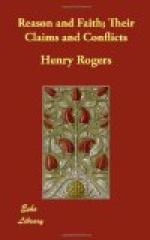On the other hand, we firmly believe, from the natural relations of truth with the constitution of the mind of man, that, with the exception of a very few cases of obliquity of intellect, which may safely be left to the merciful interpretations and apologies of Him who created such intellects, those who thus honestly and industriously ‘seek’ shall ’find;’—not all truth, indeed, but enough to secure their safety; and that whatever remaining errors may infest and disfigure the truth they have attained, they shall not be imputed to them for sin. According to the image which apostolic eloquence has employed, the Baser materials which unavoidable haste, prejudice, and ignorance may have incorporated with the gold of the edifice, will be consumed by the fire which ’will try every man’s work of what sort it is,’ but he himself will be saved amidst those purifying flames. Like the bark which contained the Apostle and the fortunes of the Gospel, the frail vessel may go to pieces on the rocks, ‘but by boat or plank’ the voyager himself shall ’get safe to shore.’
It is amply sufficient, then, to lighten our responsibility, that we are answerable only for our honest endeavours to discover and to practise the truth; and, in fact, the responsibility is principally felt to be irksome, and man is so prompt by devices of his own, to release himself from it, not on account of any intrinsic difficulty which remains after the above limitations are admitted, but because he wishes to be exempt from that very necessity of patient and honest investigation. It is not so much the difficulty of finding, as the trouble of seeking the truth, from which he shrinks; a necessity, however, from which, as it is an essential instrument of his moral education and discipline, he can never be released.
If the previous representations be true, the conditions of that intelligent faith which God requires from his intelligent offspring, may be fairly inferred to be such as we have already stated;—that the evidence for the truths we are to believe shall be, first, such as our faculties are competent to appreciate, and against which, therefore, the mere negative argument arising from our ignorance of the true solution of such difficulties, as are, perhaps, insoluble because we are finite, can be no reply; and, secondly, such an amount of this evidence as shall fairly overbalance all the objections which we can appreciate. This is the condition to which God has obviously subjected us as inhabitants of this world; and it is on such evidence we are here perpetually acting. We now believe a thousand things we cannot fully comprehend. We may not see the intrinsic evidence of their truth, but their extrinsic evidence is sufficient to induce us unhesitatingly to believe, and to act upon them. When that evidence is sufficient in amount, we allow it to overbear all the individual difficulties and perplexities which hang round the truths to which it is applied, unless, indeed, such




